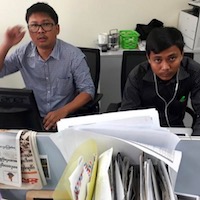News
Two Reuters journalists held in Myanmar to be honoured in US
Wednesday 14 February 2018

The two Reuters reporters detained in Myanmar for the past two months are to receive a US writers award.
Wa Lone and Kyaw Soe Oo (photo) will receive the PEN/Barbey Freedom to Write Award, the writers organisation PEN America announced. The award recognises imprisoned writers targeted for exercising freedom of speech.
“The two men embody the principles that PEN America champions,” Reuters president and editor-in-chief Stephen Adler told The Washington Post. “Their investigation into the Inn Din massacre illustrates both the vital importance of the freedom to write and the incredible power of the written word.”
They were arrested on 12 December after going to meet two policemen at a restaurant in Yangon, Myanmar’s largest city.
They had been investigating a massacre by the country's military in Inn Din, a fishing village in the country's Rakhine state which is the home of most of the country’s Rohingya Muslim minority.
Their account of the operation was published by Reuters a week ago.
The reporters were accused by the government of having “illegally acquired information with the intention to share it with foreign media.” They are being held under the country's Official Secrets Act, but they have yet to be charged officially and continue to be denied due process. If convicted, the journalists could face up to 14 years in prison.
The Freedom to Write Award honours writers and journalists jailed for their work. Some 42 jailed writers have received the award since 1987, and 37 of them were ultimately released. “It can help elevate the case diplomatically,” said Suzanne Nossel, executive director of PEN America.
She hopes that news of the award will reach the two men in prison and help lift their spirits. Past winners of such awards have commented on the psychological boost they got from knowing that their work - and the risks they accepted to report difficult stories - were being acknowledged publicly even as they were being denied a voice.
“There is… a morale aspect of it to know that you are not forgotten,” Nossel added. ■
- SOURCE
- The Washington Post
- « Previous
- Next »
- 620 of 2177